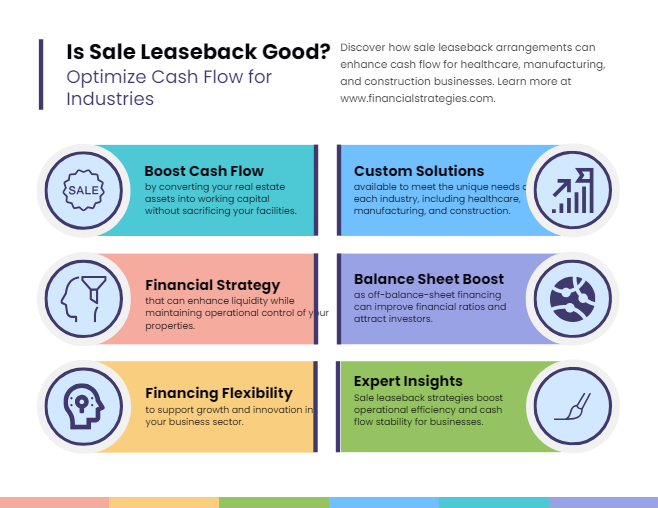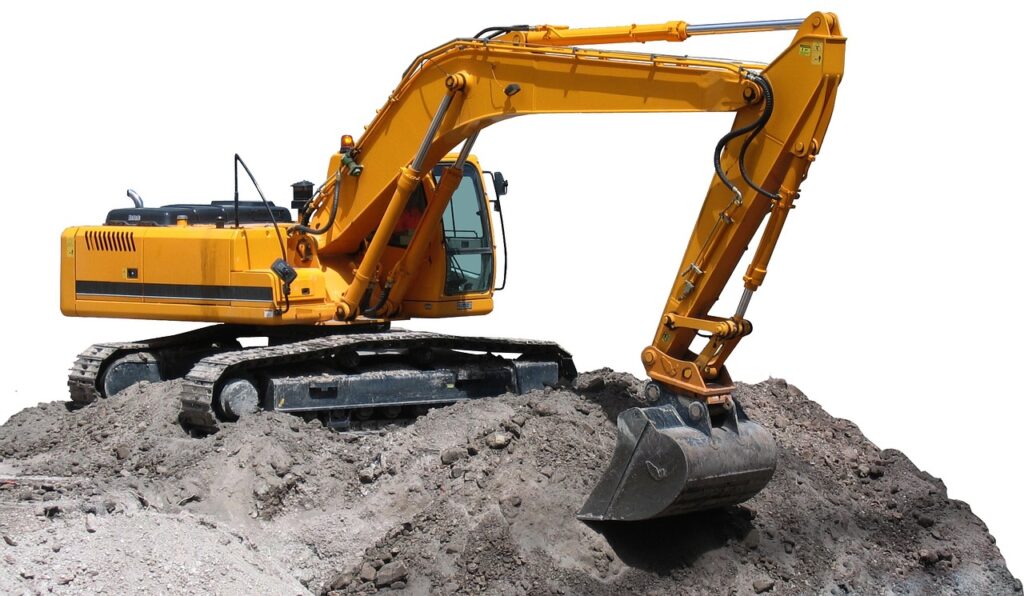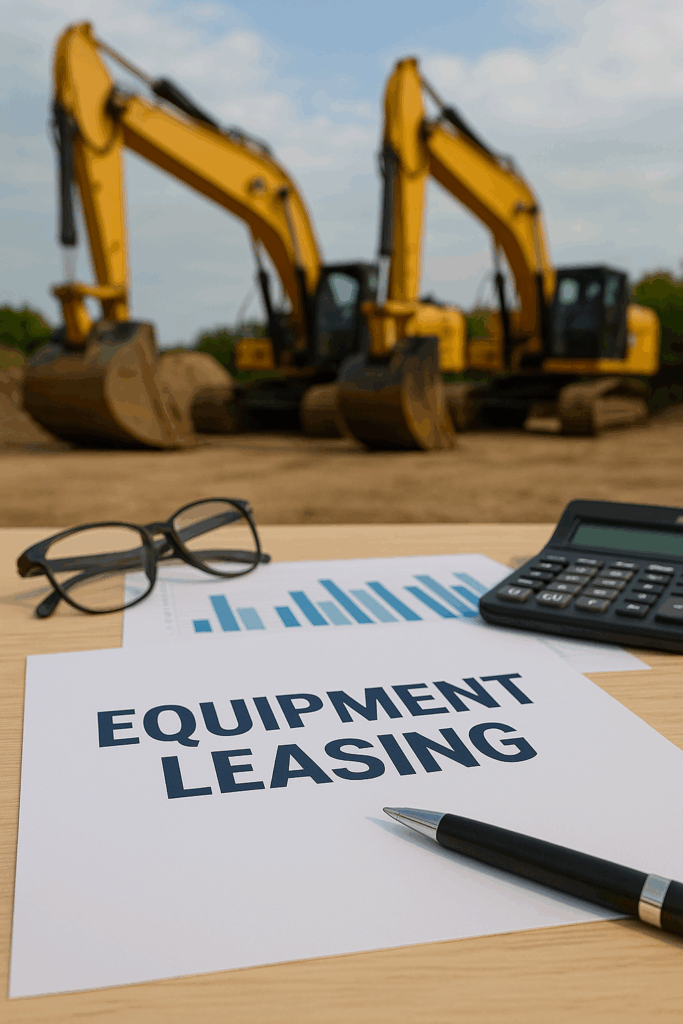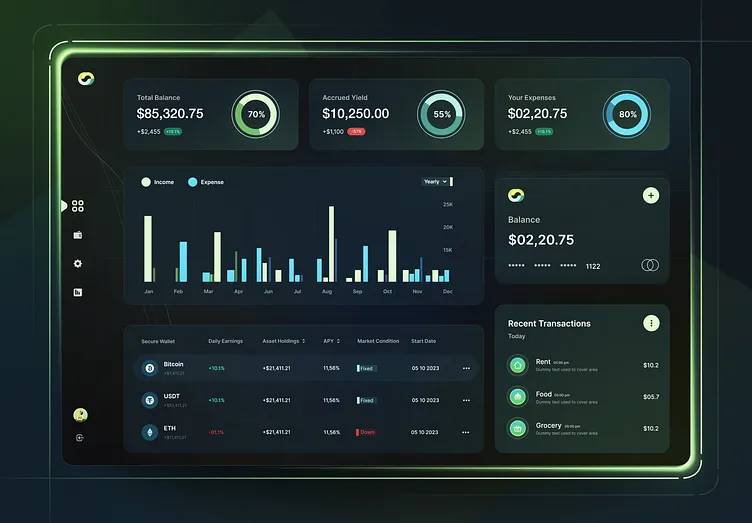Introduction: Unlock the Value of Your Assets
Did you know businesses in industries like healthcare, manufacturing, and construction often have millions of dollars tied up in essential equipment? What if you could unlock that capital without disrupting your operations? Enter sale-leaseback financing—a strategic solution that enables businesses to convert fixed assets into liquid capital while continuing to use them.
In this guide, you’ll discover how sale-leaseback financing works, its benefits, industry-specific applications, and why it’s a smart choice for businesses in capital-intensive industries.
What Is Sale-Leaseback Financing?
Sale-leaseback financing is a two-step financial solution that allows businesses to sell their owned equipment, real estate, or other high-value assets to a financing partner while continuing to use them under a lease agreement. This innovative approach helps companies unlock capital tied up in fixed assets, providing immediate liquidity without disrupting operations.
The flexibility of sale-leaseback financing has made it a growing trend across industries. According to recent data, the market for sale-leaseback transactions has increased by 20% annually, as more businesses recognize its value as a strategic cash flow solution in uncertain economic climates.
How Sale-Leaseback Works
- Asset Valuation: Your assets are appraised to determine their fair market value.
- Sale Agreement: You sell the assets to a financing partner, receiving immediate capital.
- Leaseback Contract: You lease the assets back under agreed terms, continuing to use them without interruption.
- Cash Flow Deployment: The capital generated can be reinvested in growth initiatives, debt reduction, or operational expenses.
Example:
A manufacturing firm sold $1.5 million in production machinery through a sale-leaseback agreement. The funds were used to invest in new automation technology while maintaining full use of the equipment, resulting in a 25% increase in productivity within 12 months.
Case Study: Lion Tech Finance Helps Healthcare Provider Unlock $5 Million in Capital
Background
A regional healthcare provider in California faced a financial challenge during an ambitious expansion project. The hospital planned to build a state-of-the-art outpatient surgery center to serve a growing patient base. However, the hospital’s available cash flow was insufficient to cover the project’s $5 million cost, and traditional financing options, such as loans, came with high interest rates and restrictive terms.
Additionally, their balance sheet showed significant capital in diagnostic imaging equipment, including MRI machines, CT scanners, and ultrasound systems—essential for operations but underutilized in financial value.
The Solution
The hospital’s CFO partnered with Lion Tech Finance, which proposed a tailored sale-leaseback financing solution to unlock the value of their diagnostic equipment without interrupting patient care.
Process:
- Asset Valuation: Lion Tech Finance conducted a thorough appraisal of the hospital’s imaging equipment, determining its fair market value to be $5 million.
- Sale Agreement: The hospital sold the equipment to Lion Tech Finance, receiving the full $5 million in capital upfront.
- Leaseback Contract: A flexible lease agreement allowed the hospital to continue using the equipment for a fixed monthly payment.
- Capital Deployment: The unlocked capital was reinvested into the construction of the outpatient surgery center.
Results:
- Immediate Liquidity: Access to $5 million enabled the hospital to complete the surgery center on schedule.
- Operational Continuity: High-quality patient care was maintained without equipment downtime.
- Improved Financial Ratios: Removing depreciating assets improved the hospital’s debt-to-equity ratio.
- Community Impact: The new surgery center increased patient capacity by 40%, reducing wait times and enhancing healthcare outcomes.
Use Cases by Industry
1. Healthcare
Healthcare providers often invest heavily in diagnostic and surgical equipment, which can tie up capital. Sale-leaseback financing allows hospitals and clinics to unlock funds for expansion, R&D, or staffing.
Example:
A regional hospital unlocked $2 million in capital by entering a sale-leaseback agreement for imaging systems. The funds were used to recruit specialized surgeons and expand outpatient services, leading to a 30% revenue increase within a year.
2. Manufacturing
Manufacturers rely on expensive machinery like CNC tools, robotics, and assembly lines. Sale-leaseback financing offers the flexibility to reinvest in technology upgrades or address supply chain challenges.
Example:
A manufacturer sold $1 million worth of equipment to implement an AI-driven production system, increasing efficiency by 25% and reducing costs by 15%.
3. Construction
Heavy equipment like cranes, bulldozers, and excavators represents a significant financial investment. Sale-leaseback ensures construction firms maintain liquidity for new projects.
Example:
A construction firm used sale-leaseback financing to fund a $10 million infrastructure project, keeping all equipment operational while improving cash flow.
4. Retail and Hospitality
Businesses in retail and hospitality can unlock capital tied to real estate assets for growth initiatives or operational costs.
Example:
A hotel chain utilized sale-leaseback for property assets, raising $3 million to renovate its flagship locations, leading to a 20% increase in bookings.
Enhanced Benefits of Sale-Leaseback Financing
1. Unlock Immediate Cash Flow
Sale-leaseback financing provides businesses with an efficient way to convert capital tied up in fixed assets into liquid funds. This immediate cash infusion can be used for various purposes, such as:
- Funding growth initiatives like new product development or market expansion.
- Covering operational expenses during periods of cash flow constraints.
- Seizing time-sensitive opportunities, such as acquisitions or large contracts.
By leveraging sale-leaseback financing, businesses can avoid the delays and limitations of traditional financing methods, allowing them to act decisively and strategically.
2. Maintain Operational Continuity
One of the most significant advantages of sale-leaseback financing is that businesses can continue using their sold assets without any disruption to daily operations. This ensures:
- Business Continuity: Critical equipment or real estate remains fully operational, preventing downtime that could harm productivity or customer satisfaction.
- No Need for Replacement Costs: Businesses can avoid the expense of replacing essential assets, which would often negate the benefits of a traditional sale.
This feature is particularly beneficial for industries like healthcare, manufacturing, and construction, where uninterrupted access to equipment is essential for revenue generation.
3. Improve Balance Sheets
By removing depreciating assets from the balance sheet, sale-leaseback financing can significantly enhance a company’s financial health. Key benefits include:
- Improved Financial Ratios: Transferring asset ownership can lower debt-to-equity ratios, making the company more attractive to lenders and investors.
- Reduction in Depreciation Expenses: Depreciating assets are removed from the books, which can improve earnings and profitability metrics.
- Increased Borrowing Capacity: With a cleaner balance sheet, businesses may gain access to more favorable terms for future financing needs.
This restructuring can position the business for long-term financial stability and growth.
4. Flexible Lease Terms
Sale-leaseback agreements are designed with flexibility in mind, allowing businesses to tailor repayment structures and lease terms to fit their unique needs. Advantages include:
- Custom Payment Schedules: Align lease payments with cash flow patterns, such as seasonal revenue fluctuations or project timelines.
- Term Length Options: Choose lease durations that align with the asset’s useful life or business strategy.
- Scalability: Agreements can be adjusted to support future changes, such as adding new equipment or expanding operational capacity.
This flexibility ensures that businesses can maintain financial control while optimizing their asset usage.
5. Tax Advantages
Sale-leaseback financing offers potential tax benefits, depending on how the lease payments are structured. Benefits may include:
- Tax-Deductible Lease Payments: Monthly lease payments are often classified as operating expenses, reducing taxable income and providing immediate savings.
- Avoiding Depreciation Management: With asset ownership transferred, businesses no longer need to account for depreciation, which simplifies tax reporting.
- Potential Access to Tax Credits: In some cases, the lessor may qualify for tax credits associated with asset ownership, which could lead to favorable lease terms for the business.
These tax benefits can enhance the overall value of the financing arrangement, making it a cost-effective alternative to traditional funding options.
Examples by Industry
Healthcare Example:
A hospital uses sale-leaseback financing to unlock $3 million in capital tied up in diagnostic imaging equipment. The immediate liquidity is used to hire specialists and expand outpatient services, while the lease agreement ensures continuity of patient care.
Manufacturing Example:
A manufacturer sells $2 million worth of robotic equipment to upgrade its assembly line. The flexible lease terms align with the company’s seasonal production cycles, reducing financial strain during low-demand periods.
By unlocking cash flow, ensuring operational continuity, enhancing balance sheets, and offering flexible terms and tax benefits, sale-leaseback financing empowers businesses to optimize their resources and thrive in competitive markets.
When Should You Consider Sale-Leaseback?
- Expanding Operations: Need funds for new locations or projects.
- Managing Debt: Reduce reliance on high-interest loans.
- Improving Financial Flexibility: Prepare for economic uncertainties.
- Investing in Innovation: Fund R&D or technology upgrades.
How to Choose the Right Sale-Leaseback Partner
When selecting a sale-leaseback partner, it’s not just about finding a financing provider—it’s about finding the right partner who understands your business needs, offers fair terms, and ensures the process is seamless and mutually beneficial. Here’s why Lion Tech Finance is the ideal choice for your sale-leaseback financing needs.
1. Industry Expertise
Not all sale-leaseback partners are created equal. Choosing one with deep experience in your specific sector ensures that the nuances of your business and assets are fully understood.
Why Lion Tech Finance?
At Lion Tech Finance, we specialize in industries such as healthcare, manufacturing, construction, and logistics. Our team understands the operational challenges and opportunities unique to your sector. This industry-specific insight allows us to craft financing solutions that align with your goals, ensuring maximum value and minimal disruption.
2. Transparent Terms
The financial terms of a sale-leaseback agreement should be clear, concise, and upfront. Transparency not only builds trust but also ensures there are no surprises throughout the agreement.
Why Lion Tech Finance?
We pride ourselves on providing clear, easy-to-understand agreements. Our team will walk you through every step of the process, explaining all costs, terms, and conditions. With Lion Tech Finance, you’ll have the confidence of knowing exactly how your leaseback agreement works and what to expect.
3. Competitive Asset Valuation
The success of a sale-leaseback arrangement begins with a fair and accurate appraisal of your assets. An undervalued appraisal can leave money on the table, while overvaluation can result in unsustainable financial terms.
Why Lion Tech Finance?
Our valuation process is rooted in fairness and transparency. We use market-leading appraisal techniques to determine the true fair market value of your assets. This ensures you receive the maximum upfront capital while maintaining lease payments that fit your budget.
4. Custom Agreements
Every business has unique needs, and a one-size-fits-all leaseback agreement can fall short of providing the flexibility required to meet your objectives.
Why Lion Tech Finance?
We offer fully customized leaseback agreements tailored to your business. Whether you need flexible payment schedules to accommodate seasonal cash flow or shorter lease terms for rapidly depreciating equipment, Lion Tech Finance works with you to create a solution that fits seamlessly into your financial strategy.
5. Speed and Efficiency
Time is often of the essence when businesses turn to sale-leaseback financing. Delays can jeopardize growth opportunities or create operational bottlenecks.
Why Lion Tech Finance?
Our streamlined processes ensure quick asset appraisals, agreement drafting, and funding disbursement. Many of our clients secure the capital they need within 30 days or less, empowering them to move forward with confidence and agility.
6. Commitment to Your Success
Beyond financial transactions, your sale-leaseback partner should act as a strategic ally, committed to your long-term success.
Why Lion Tech Finance?
At Lion Tech Finance, we view each client relationship as a partnership. Our goal is not just to provide financing but to help you achieve your broader business objectives. From unlocking capital for growth to improving financial ratios, we’re here to support your success every step of the way.
Why Choosing Lion Tech Finance Matters
With Lion Tech Finance, you gain more than just a financing partner—you gain a trusted advisor who understands your industry, values transparency, and tailors solutions to your business. We have a proven track record of helping businesses unlock the capital they need to grow, innovate, and thrive, all while maintaining operational continuity.
Ready to get started? Let Lion Tech Finance show you how a tailored sale-leaseback solution can empower your business to unlock its full potential. Contact us today!
Common Questions About Sale-Leaseback Financing
Q: What types of assets qualify?
A: Equipment like medical devices, heavy machinery, and real estate typically qualify.
Q: Are there tax advantages?
A: Yes, lease payments may be tax-deductible, reducing your tax burden.
Q: How does it affect my balance sheet?
A: Sale-leaseback shifts asset ownership off your books, improving financial ratios.
Conclusion: Unlock Your Business’s Potential
Sale-leaseback financing offers a powerful way for businesses in healthcare, manufacturing, construction, and beyond to unlock capital, improve cash flow, and thrive in competitive markets. Whether you’re expanding operations, managing debt, or investing in innovation, sale-leaseback financing provides the flexibility and liquidity you need without sacrificing essential assets.
Ready to transform your cash flow? Contact Lion Tech Finance today to learn how we can help you achieve your goals.







